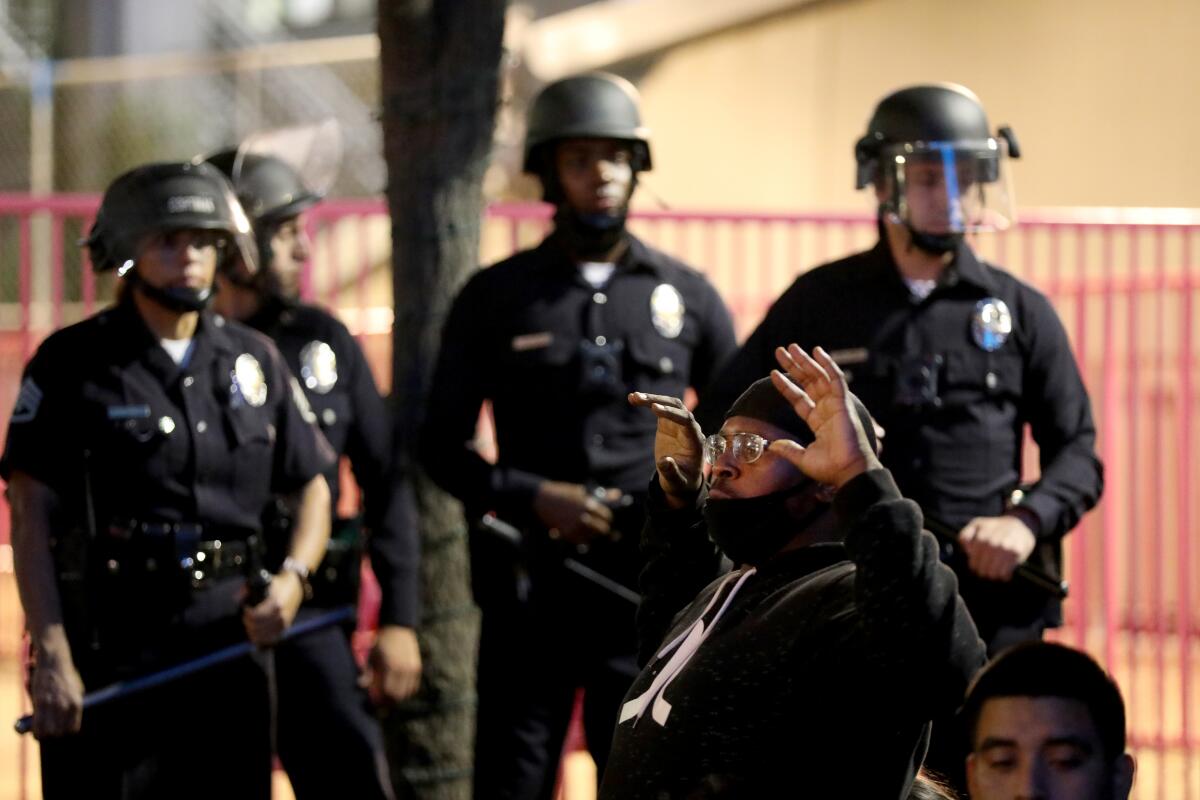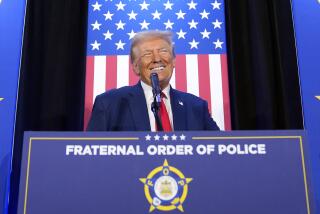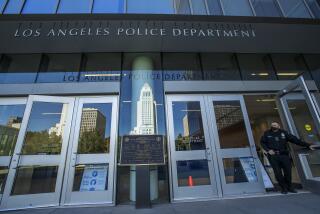Editorial: Hereâs how to hold police accountable: Donât let their unions give money to prosecutors

Amid reports from across the country about escalating clashes between protesters and law enforcement, itâs worth looking underneath the images for the roots of the outrage. It is the extrajudicial killings of unarmed people by police, and not the protests against them, that too often spark the cycle of violence and death in the United States. It is the cruel and unyielding knee on the neck of George Floyd in Minneapolis, and thousands of other police officer knees, fists and trigger fingers that undermine public safety and instill fear.
Thatâs why we need to demand accountability and change from law enforcement and the criminal justice establishment that too often shrugs at police violence.
The ties that bind elected officials to police unions must be broken. District attorneys and other elected prosecutors should reject campaign donations and endorsements from law enforcement labor groups, because union support compromises a prosecutorâs independence and clouds the decision over whether to criminally charge police who abuse their power. It diminishes a D.A.âs incentive to seek out and share with defense lawyers â as the 6th Amendment requires â the names of officers whose past misconduct undermines their value as prosecution witnesses. It undercuts a D.A.âs impulse to fight laws that hide from the public the names of problem officers.
Bar associations should revise their ethics rules to forbid candidates for district attorney (and city prosecutor and stateâs attorney) to accept police union money. Lawmakers should adopt laws to likewise prohibit the practice â although they will find it easier to do if they, too, say no to police union largess.
Police unions have every right to advocate for the pay, benefits and working conditions of their members. But one of their tasks is to defend officers in misconduct cases, and that makes the conflict of interest readily apparent. An elected official considering whether to prosecute officers should not be, in essence, on the political payroll of the agency defending the very same people.
These unionsâ power to raise and dispense large amounts of campaign cash has warped the electoral process and has slowed or blocked reasonable efforts to hold officers accountable for bad performance. Elected prosecutors should not be in the unionsâ thrall. Nor, for that matter, should elected sheriffs.
A handful of police unions criticized the officers involved in the death of Floyd. But police unions are generally the loudest voices defending bad officers and dismissing reasonable efforts to improve officer performance. A case in point: Minneapolis Police Union leader Bob Kroll is a strong supporter of President Trump at least in part because of the presidentâs contempt for the 2015 recommendations of the federal Task Force on 21st Century Policing. Many law enforcement unions decried the task force report, which called for sensible steps to improve police transparency and accountability, enhance oversight and strengthen relationships with policed communities, all in order to build public trust.
It was a lost opportunity, and we are now paying the steep price. Public trust in police is lacking because of actions like the killing of Floyd. Relationships that might have permitted a more constructive response to his death were not built.
Even before the Floyd killing, reform advocates in Los Angeles and elsewhere began calling for police budgets to be slashed and the money spent instead on social services. Itâs an understandable position, although off-base in its particulars. Lower funding translates into fewer officers, which in turn leads to precisely the occupation-style approach to policing that causes such tension here and in other U.S. cities.
But at a time of economic near-collapse, L.A.âs proposed budget includes officer raises far out of proportion to pay increases for other city workers â plus shocking bonuses for officers with college degrees. The L.A. Police Protective League â which, it should be noted, issued a statement decrying the killing of Floyd in Minneapolis â is a big financial supporter of most of L.A.âs elected officials.
Earlier this year, without raising money for incumbent Los Angeles Dist. Atty. Jackie Lacey directly, the union put up $1 million to defeat her reform-oriented opponent, George GascĂłn. (The Times has endorsed GascĂłn.) It was an independent expenditure, and as such it backed the candidate without necessarily creating the same kind of conflict of interest as a direct donation.
On Sunday, Lacey issued a rather weak statement regarding the âculmination of injustice,â decrying violent protests and expressing sympathy to Floydâs family. It made no mention of police or the cause of Floydâs death.
Meanwhile, a group of more than 40 district attorneys put out a statement Thursday calling for structural changes in the criminal justice system along the lines of the task force recommendations, including severing the financial link between elected prosecutors and police unions. Lacey was invited to sign. For now, at least, she has not.
More to Read
A cure for the common opinion
Get thought-provoking perspectives with our weekly newsletter.
You may occasionally receive promotional content from the Los Angeles Times.










